When Mashable asked me about transphobia.
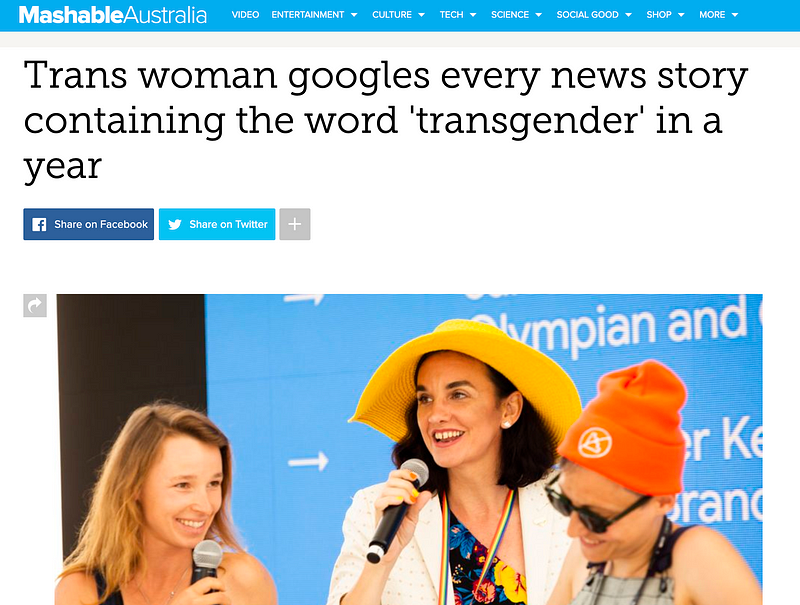
In an elegant piece by Rachel Thompson for Mashable I was given the chance to think a little more deeply about an artwork I made recently regarding Trans issues and the way they are covered. The article is great : https://mashable.com/article/trans-media-coverage-fourth-estate/ but I also wanted to share my thoughts in full.
Could you tell me a bit about the idea that prompted you to Google & print out headlines of UK media coverage of trans people?
Sure. Mainly it’s a response to the effect of framing a national conversation around ‘reasonable questions’ that primarily generate fear. I just wanted to see, without cherry-picking the ‘bad’ headlines, how out of control the situation was. It was provoked by having to have a full-on family dinner table conversation after my brother gave an impromptu opinion on the role of trans people in sport, women’s spaces and the ‘danger to the kids’. It was as surprising as it was personally devastating.
After an emotional discussion it was even harder to persuade everyone that this was literally regurgitating ideas we’d seen on the front pages for the last few years. ‘Concerns’ that were not-concerning when I actually transitioned.
For me that became the question about what happens to minorities when they are vilified in the press (would this ‘debate’ be ‘reasonable’ if they used the same expressions about other marginalised groups, or ethnic, religious, or disabled communities). I wanted people to see where those ideas emerge from in a non-partisan review of the year’s headlines.
Then came an invitation from Daniel Cookney from Salford Uni. who was putting an exhibit together for Manchester’s People’s History Museum. I still nearly didn’t do it. It was just a passion project.
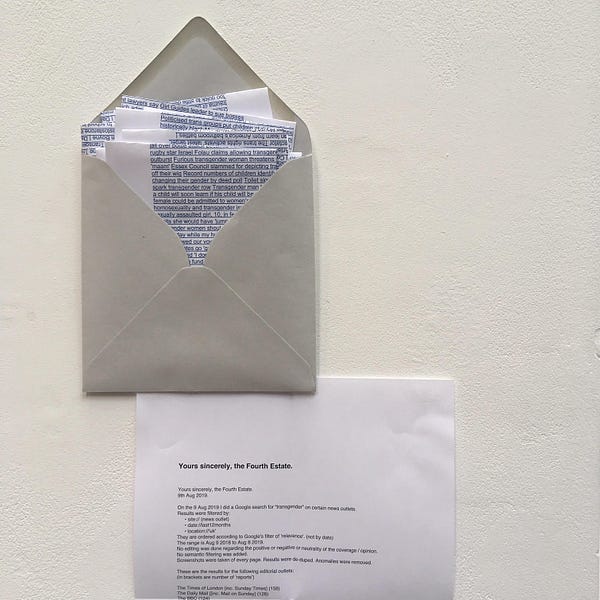
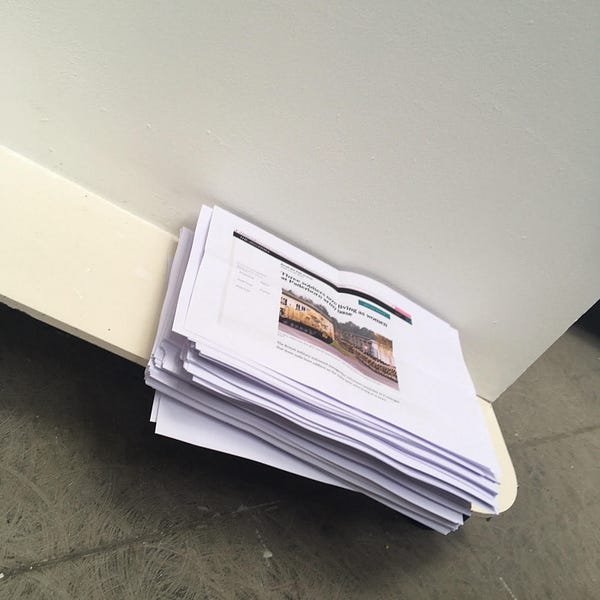
What were the key things that stood out to you when you looked at the 878 articles? Did any trends emerge?
- Mainly the volume of stories that relate to such a small percentage of the population. Nearly three stories a day, every day, all year (from only 9 sources) is just not normal. It’s not a news cycle. It’s a campaign.
- The absence of trans voices - mainly because our trusted voices no longer trust the press to report them, or to protect them. Munroe Bergdorf is a classic case, but she is far from being alone.
- The question of who is being silenced. This is interesting because ‘gender critical’ or ‘trans-exclusionary’ voices are clearly not silenced in the popular media; where they probably are silenced is in the area of policy: in legal and health discussions. This is the domain of expertise, PHD’s and decades of rigorous research by underpaid academics - and in those spaces yes, I’d imagine the arguments of these voices have been heard, discussed and dismissed. In that way it is very similar to climate change or immigrant bashing. The only oxygen remaining for these flames is via the free press, the fourth estate. Hence ‘Yours sincerely, the fourth estate’
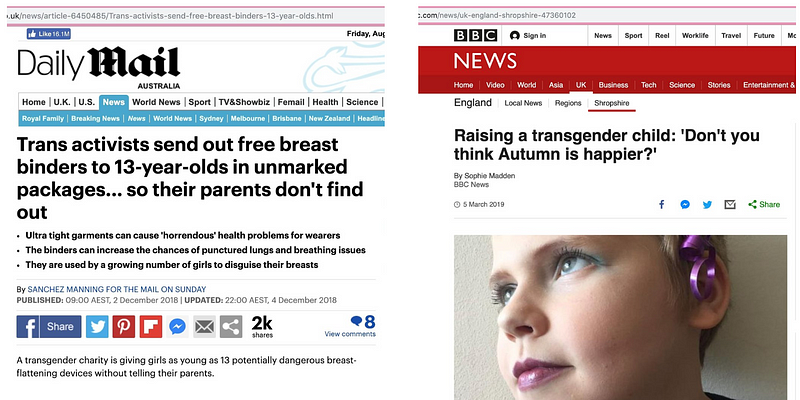
What was the overall tone of the coverage?
I said in a tweet it is ‘neutral to negative but that it skews negative’ however I don’t have metrics. It wasn’t meant to ‘prove’ anything like that - it’s just overwhelming. And we’re talking about headlines, not content. They’re all there - you can just swipe through a year and understand what that feels like to be trans and to get that in your face all day.
There is this obsession with ‘reasonable questions’ (that has caused an increasing paranoia in the trans community) and our responses. Whether the obsessive quality of all these trans stories is innocent in intent, or malign, or sinister - is hard to fathom. I am a trans woman; I was raised a feminist. I don’t like the idea of women’s spaces being unsafe. I have children, I too respond badly to anything that says my children are at risk. But, even when the risks are real - rarely is the discussion framed as quantifiable risk assessment. Because through that lens, what is a very minor risk for one community can be balanced against a profound, ongoing and existential risk for the trans community.
Here’s a good example from the guardian. ‘Reasonable’ is such a disingenuous term and my community have become so used to seeing the word ‘reasonable’ (reasonable point, reasonable argument, reasonable to say, reasonable people, reasonable views) that it is has become our equivalent to “I’m not racist but…”
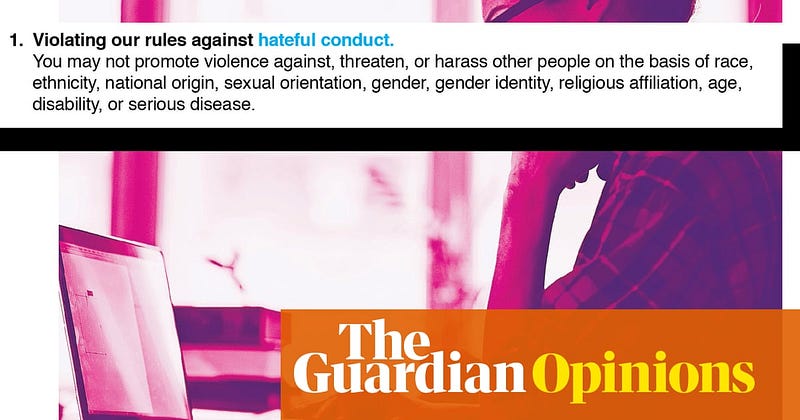
Debate ends when we label views we simply disagree with as ‘hatred’ | Kenan Malik
There are reasonable arguments on both sides of the debate. There are also unreasonable arguments on both sides. That’s what makes it a difficult issue. Simply saying this, however, is itself taken by many to be transphobic. It is bigotry, trans activists insist, to question the validity of self-identification or to object to trans women being allowed into women-only spaces.
It seems ‘reasonable’ right? But the next line:
“Simply saying this, however, is itself taken by many to be transphobic.” explains in other words, the ‘reasonable people’ on one side are rather less reasonable than the people on the other.
Effectively: “I’m not [racist] transphobic but.., i (a man) should be allowed to object to women (trans women) being allowed in women’s spaces.”
Another common response from trans critical thinking is “but what about the bad guys?” - i.e. the possible illegal actions of criminals, cis & trans, - well, their misbehaviour is already covered by MANY actual laws in EVERY country on earth, but also: https://twitter.com/CateSpice/status/1153756368978894848
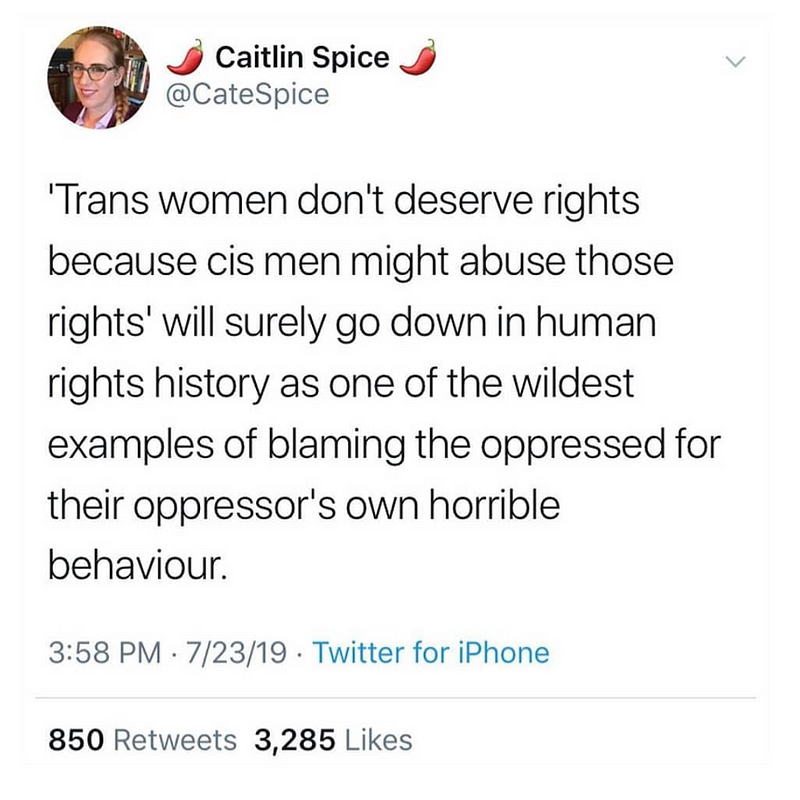
One thing that is worth noting is that there is another, different story. We are witnessing a truly fascinating evolution of the cultural conversation around gender and sexuality and attraction and biology. This topic is as interesting to neuroscience and behavioural psychology as it is sociologists or lgbtq activists. There’s a fab NYT op ed from 2016 called Hipsters broke my Gaydar about appropriation and identity - and the ripple effect of that loss of identity amongst the queer community may well be in the mix here.
It is a way of understanding the outrage of a generation of second-wave feminists at the presence of ‘male’ bodies in spaces that they fought for years to make safe for ‘women’; The ‘loss of identity’ concept is a lens to understand the threat of erasure felt by a vocal minority of lesbians. And together they show why both groups might look to scapegoat parts of their own community as a result. I do understand those perspectives and can empathise with them even though I disagree.
Change is very very hard for humans. We don’t like ideas or values changing under our feet.
So my view is that it is a complicated, evolving, fascinating and ultimately radically empowering discussion that should not be conflated with garden-variety transphobia that we see in the large majority of the headlines.
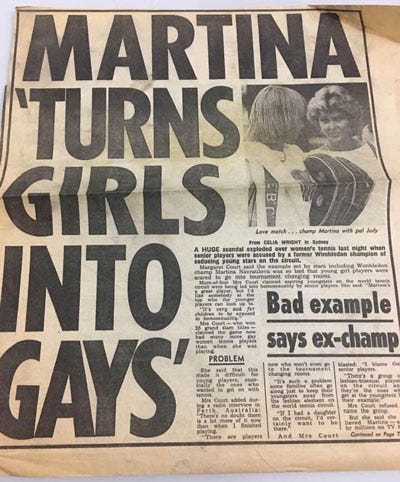
FEAR SELLS
We saw the media do 'fear sells' during the 'gay panic' of the 1980s which so many of the more vitriolic headlines recycle. That part, the hate, is just the dull historical cycle of fear-mongering.
It is well chronicled: https://twitter.com/ImplausibleGrrl/status/1100719714387484672
You mention in your Instagram that you're going to send the stories back to the newspaper people. Are you sending them back to the reporters who wrote the stories or the editors in charge of editorial strategy?
Actually that was just an idea posed by Daniel as we both felt guilty of printing out two reams of paper to make a point. I hadn’t really thought that through. I just want to recycle the printer cartridges. But maybe :)
What do you hope the newspaper people will glean from receiving the print-outs? What is your message to them?
I’d love them to see how obvious their obsession is. It’s like, super creepy.
The message is:
a) Find answers to your ‘reasonable questions’ before you write or commission the same trans piece, by the same writer, about the same questions (again). We’d suggest using the informed, global network of expertise for discussion topics rather than an under-researched opinionated columnist or sporting bodies who don’t understand what a trans body is. Yes it’s boring. But it’s also scientific and socially responsible and, well, news. Or, more importantly, very very often, not news.
b) Realise that, sadly, the trans aren’t going to evaporate in the glare of your ‘reasonable concerns’.
c) Let writers approve the headline that their name will sit under for digital eternity. Don’t let them hide behind a ‘sub’.
Actually - the message is on the site - Do better / Or.. perhaps, just leave us alone.
Do you think UK media has a transphobia problem?
Ha ha ha ah ahha haaaa.

